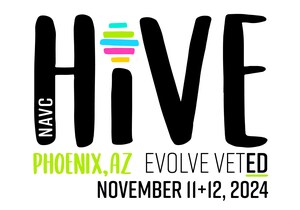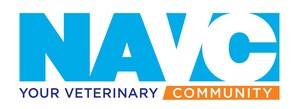Veterinary healthcare teams are the best resource for helping consumers count pets' calories and define a nutrition strategy to help animals live longer, better lives
ORLANDO, Fla., May 4, 2022 /PRNewswire/ -- Who can ignore the wide, eager eyes and wagging tail or purr of an adoring pet sending a strong hint that a treat would hit the spot? Pet owners know those looks are hard to resist and treats are a way to reinforce the bond with their animal companions.
Yet, like humans who may struggle with maintaining a healthy weight, many pets are obese, with an estimated 60% of cats and 56% of dogs classified as being overweight. Giving too many treats adds excess calories and can contribute to a nutritional imbalance in a pet's diet.
"Nutrition is a cornerstone of animal health. Proper nutrition is critical for overall wellness, disease management and prevention for pets," said Dana Varble, DVM, CAE, Chief Veterinary Officer at the North American Veterinary Community (NAVC). "With a wide variety of food products on the market along with different philosophies on what's best for animals, it's important for pet owners to seek nutritional guidance from the people who truly know their animals' dietary needs: their veterinary healthcare team."
Kara M. Burns, MS, MEd, LVT, VTS (Nutrition), VTS-H (Internal Medicine, Dentistry), a recognized expert on animal nutrition, who has presented on the topic of animal nutrition to veterinary professionals around the world, stresses that 90% of an animal's recommended daily energy requirement should come from pet food.
"Snacking on too many treats is bad for pets just like it is for people. When it comes to treats, those products should not exceed more than 10% of an animal's daily caloric intake," said Burns. "The credentialed veterinary nurse or technician can help pet owners understand the information on pet food labels and calculate the recommended amount of food versus treats, based on a specific animal's needs."
Similar to registered nurses in human healthcare, credentialed veterinary nurses/technicians are highly educated professionals who provide a wide range of veterinary care to pets, including nutrition. They have an associate or bachelor's degree in veterinary technology and have studied anatomy, physiology, pharmacology, anesthesia, etc. Additionally, they are able to pursue 16 areas of specialization, including nutrition, emergency and critical care, anesthesia and analgesia, and more. Those who have achieved a nutrition specialization have completed 4,000 hours work experience in the animal nutrition field, clinical or research. Additionally, they completed 40 continuing education hours related to veterinary nutrition, animal nutrition or nutrition research, managed multiple nutrition cases in more than one species, and passed an arduous specialized exam. The National Association of Veterinary Technicians in America (NAVTA) offers resources for veterinary nurses/technicians seeking specialization certification.
"Credentialed veterinary technicians are dedicated to providing the best care for pets and that can often involve helping pet owners navigate the nutritional needs of their animals – needs that are sometimes overlooked. Nutritional requirements change throughout a pet's lifetime and can also play an important role in managing medical conditions," said Allison Flinn, BS, RVT, a Technician Supervisor at VCA All Pet Emergency Center in Evansville, IN, and a certified animal weight coach. "Credentialed technicians have a wealth of knowledge to share with pet owners and we're eager to help. We can help owners interpret nutrition labels to better understand what they are feeding their pets and we often help owners implement the veterinarian's recommendations for appropriate dietary changes, supporting them throughout the process."
Credentialed veterinary nurses/technicians can provide important nutritional guidance including:
- Various nutritional needs at each life stage and how much to feed your pet.
- How certain nutrients help to manage a disease or condition.
- Techniques to transition your pet to a new diet and ways to encourage pets to try new foods.
- What to do if the pet does not like their new diet food or has any issues associated with a particular food.
VCA offers a number of articles on its website to help pet owners with questions about their animals' nutrition.
The entire veterinary team can take the Pet Nutrition Coach Certification Course and the Pet Nutrition Coach Therapeutic Certification Course through the NAVC's year-round virtual education platform, VetFolio.
The NAVC and VCA Animal Hospitals, with support from NAVTA, have teamed up to help pet owners better understand how the many different members of veterinary healthcare teams are highly educated and valued partners in ensuring the health and wellbeing of pets.
About the NAVC
The North American Veterinary Community (NAVC) is a nonprofit organization dedicated to supporting and advancing veterinary professionals worldwide. The world's leading provider of veterinary continuing education, the NAVC delivers essential training, tools and resources for veterinary professionals to stay abreast of advances in animal medicine and provide the best medical care for animals everywhere. Through its commitment to innovation and excellence, the NAVC has developed a diverse portfolio of products and services, including: educational events, headlined by VMX, the world's largest, most comprehensive continuing education conference and launchpad for new products and innovations within the veterinary industry; a robust digital platform for virtual learning and engagement; the veterinary industry's largest and award-winning portfolio of trade publications; and an advocacy arm which unites the veterinary community and pet lovers. The NAVC was founded in 1982 and is headquartered in Orlando, FL. Since 2017, the NAVC has been recognized annually as one of the Top Workplaces by the Orlando Sentinel. To learn more about the NAVC's products and brands, visit https://navc.com/. To see our schedule of upcoming events, visit https://navc.com/calendar/.
About VCA Animal Hospitals
A leader in veterinary care, VCA Animal Hospitals is committed to caring for the future of veterinary medicine. We are a family of hometown animal hospitals determined to positively impact pets, people, and our communities. From general practice to emergency and specialty care, VCA delivers world-class medicine to more than four million pets each year. Our national network of clinics and hospitals invest in cutting-edge tools, training and technology that enables our Associates to lead the industry today and into tomorrow. Among our talented 35,000 Associates are nearly 7,000 veterinarians – including 430 who are board-certified specialists – nearly 4,000 credentialed technicians and over 10,000 veterinary assistants – all dedicated to giving pets the very best in medical care.
As part of the Mars Veterinary Health family of brands, VCA is committed to the Mars Petcare Purpose—A Better World for Pets™. To learn more about VCA, visit: www.vca.com.
SOURCE North American Veterinary Community

WANT YOUR COMPANY'S NEWS FEATURED ON PRNEWSWIRE.COM?
Newsrooms &
Influencers
Digital Media
Outlets
Journalists
Opted In





Share this article